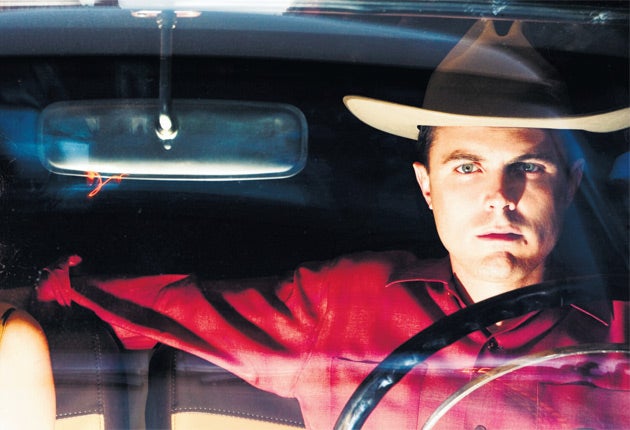The Killer Inside Me (18)
This well crafted, excessively violent story lacks irony – but largely stays true to the 'dime-store Dostoevsky' whose characters it reveals

Lou Ford, the anti-hero of The Killer Inside Me, is a nasty piece of work, and Michael Winterbottom's film is a nasty piece of work too.
It should be: it's based on a 1952 novel by American writer Jim Thompson, whose stories (film versions include The Grifters and Clean Slate) are famously the darkest and most relentless in the hard-boiled thriller genre. Merciless in their desolate psychological insights, they earned Thompson the sobriquet "dime-store Dostoevsky".
Thompson's The Killer Inside Me is a superbly crafted exercise in unreliable first-person narration: its teller and protagonist is a psychopathic killer who is also the much-liked deputy sheriff of a small Texan town. Played on screen by Casey Affleck, Lou Ford is everybody's buddy, clean as a whistle and twice as cheery. But get him alone, and he's a serpentine betrayer and a vicious thug: de Sade among the sagebrush.
We first see Lou's dark side when he's asked to politely lean on newly arrived prostitute Joyce (Jessica Alba). She plays rough, he plays rougher. The pair begin an S&M-style liaison, but then things get complicated and the violence stops being quite so playful.
You wouldn't think that British director Michael Winterbottom had a natural affinity with Thompson's transcendental grubbiness. Winterbottom is known as an upmarket experimenter who flits between genres with assurance and a certain cool distance. His adaptation is a polished, elegant affair, but with the essential Thompson sleaze never far from the surface. It looks terrific: the design by Rob Simons and Mark Tildesley beautifully evokes the dust and the shine of 1950s Texas, while Marcel Zyskind's photography has the sun-bleached look of a paperback which has languished in Woolworths' window too long.
The casting is nearly flawless. Character actors include Elias Koteas and Ned Beatty, incarnating seediness and sweat. As Lou's trusting girlfriend, Amy, Kate Hudson is note-perfect; halfway between blowsy and schoolyard wholesome, she has the perfect period manner of a good girl trying on vampdom for kicks. The hitherto bland Jessica Alba is also surprisingly good and tough, although her honeyed looks don't quite fit: she's too airbrushedly modern for that tackier, Fifties edge.
As for Casey Affleck, his distantly whiny voice and precise cleanness suggest a blank slate, but there's also something fragile, oddly girlish about his Lou, an unsettling fussy edge recalling Anthony Perkins in Psycho. Lou may be too controlled and assured to be a Norman Bates but he's close kin, for sure (and his family background is quite as murky).
Affleck's delicacy saves the part from overstatement. Winterbottom follows the novel's leads about Ford's well-concealed genius, his penchant for psychoanalysis and maths, but it's an overstatement to show him brooding to Mahler. That makes Lou too obviously 1950s America's paranoid nightmare of the European intellectual as pervert.
Now we come to the film's shock element, and its big problem: Lou's violence, and in particular, his vicious assault on Joyce. In the book, the scene occupies about half a page, and that's hard enough to take. On screen, the stakes are naturally raised by the fact that we see the violence, which goes on and on – and you don't stop flinching. To make it worse, the camera hovers at length on Joyce's battered, bloodied face. The effect is both horrifying and unnecessary: you feel you're witnessing a morbid exercise in virtuoso special-effects make-up.

Watch Apple TV+ free for 7 days
New subscribers only. £8.99/mo. after free trial. Plan auto-renews until cancelled

Watch Apple TV+ free for 7 days
New subscribers only. £8.99/mo. after free trial. Plan auto-renews until cancelled
But the casting of Alba makes the effect very different from the violence you might see in a piece of low-budget realism: an extra perverse charge is derived from the simulated mutilation of a Hollywood sex symbol famous for her plastic prettiness. This is not only a scene about psychopathic violence, it also offers a sinister taboo thrill of seeing Jessica Alba's perfect features mashed up: don't think that this footage won't become a YouTube favourite with people who enjoy that sort of thing. The effect is an obscenity that unbalances the film, not least because Winterbottom seems to be performing a coldly detached experiment, purely to see how far he can take it. (Compare Lee Marvin slinging hot coffee at Gloria Grahame in Fritz Lang's 1953 The Big Heat: a ruthlessly economical scene that shocks because it's as horrifying as it needs to be, and no more.)
Winterbottom doesn't always convince when he tries to lighten the tone, to provide us – from the retro-hip opening credits on – with a brisk, polished entertainment. The period soundtrack of country swing fits the milieu – and Lou's phoney bright side – but it often undermines the prevailing darkness. The horror of one murder, late in the film, is scuppered by setting the subsequent chase to a zingy steel-guitar rag: it's not the right moment to show us a good time.
Lou Ford and Jim Thompson are masterful manipulators. Winterbottom is simply a very smart operator, and that's not quite enough: his film lacks the ruthless control and irony that the story demands. The Killer Inside Me is sharp and sleek, and sometimes nastier than it needs to be. But finally it's cold-blooded rather than truly icy: it misses the real killer touch.
Subscribe to Independent Premium to bookmark this article
Want to bookmark your favourite articles and stories to read or reference later? Start your Independent Premium subscription today.

Join our commenting forum
Join thought-provoking conversations, follow other Independent readers and see their replies